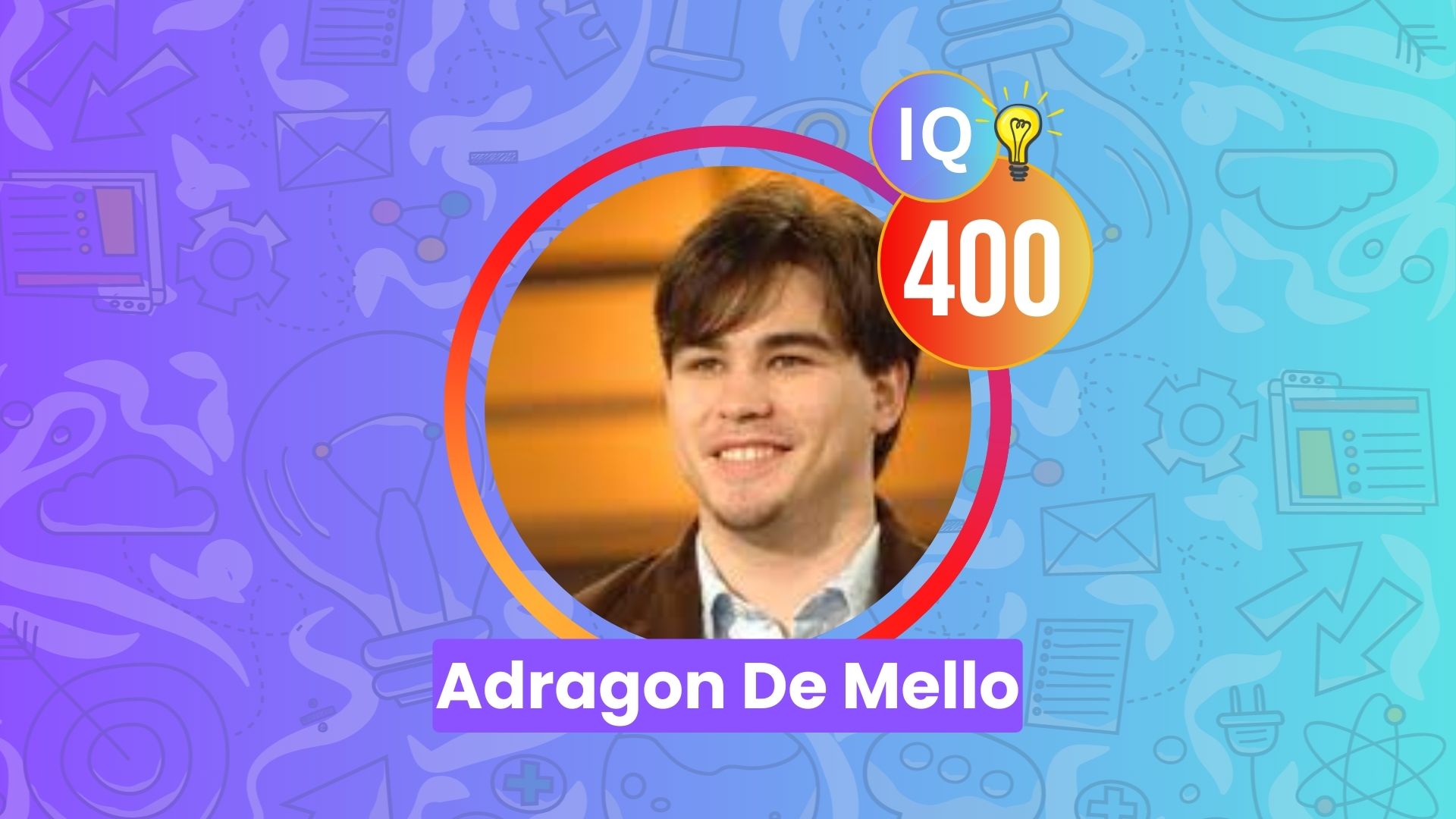Adragon De Mello: The Prodigy With A 400 IQ - Fact Or Myth?
Is it possible for a child's life to be meticulously planned from the moment they are born? The story of Adragon de Mello is a stark reminder of the immense pressure and unconventional paths some child prodigies face.
Adragon de Mello's name often surfaces in discussions about exceptional intelligence and the impact of parental ambition. Born on October 5, 1976, his early life was anything but ordinary. From a young age, his father, Agustin de Mello, embarked on what many would consider an extreme endeavor: to mold Adragon into a world-renowned genius. Agustin's vision extended far beyond simple academic success; he envisioned Adragon earning a Ph.D. in physics by the age of 12, winning the Nobel Prize by 16, and subsequently becoming a senator, president, head of a world government, and ultimately, the chairman of an intergalactic government. This grand plan set the stage for Adragon's accelerated education and the intense scrutiny that would follow.
| Category | Information |
|---|---|
| Full Name | Adragon Eastwood de Mello |
| Birth Date | October 5, 1976 |
| Birthplace | United States |
| Nationality | American |
| Education | Bachelor's Degree in Computational Mathematics, University of California, Santa Cruz (1988) |
| Occupation | Retail (as of some reports) |
| IQ (Projected) | 400 (though this figure is highly debated and likely inaccurate) |
| Notable Achievement | Youngest college graduate in the United States at age 11 (a record later broken) |
| Father's Influence | Agustin de Mello, known for his ambitious and controlling approach to Adragon's upbringing and education |
| Reference Link | Wikipedia - Information about youngest college graduate |
In 1988, at the remarkably young age of 11, Adragon de Mello graduated from the University of California, Santa Cruz, with a degree in computational mathematics. This achievement briefly made him the youngest college graduate in the United States, a record that has since been surpassed by Michael Kearney in 1994. His rapid academic progression involved condensing his junior and senior years at Santa Cruz into a single year, taking an impressive 20 courses. This accelerated pace, according to de Mello, was necessitated by the limited one-year duration of his scholarship.
The claim of Adragon de Mello possessing an IQ of 400 has been widely circulated, but it's essential to approach this figure with skepticism. IQ scores are designed to measure cognitive abilities relative to the general population, and an IQ of 400 far exceeds the range of any standardized test. While Adragon undoubtedly demonstrated exceptional intellectual abilities, the specific number is likely an exaggeration or misinterpretation. Some sources suggest a more realistic, though still very high, IQ estimate of around 185, which would still place him well above average.
The intense focus on Adragon's intellectual development raises questions about the ethics of pushing a child prodigy to such extremes. While Agustin de Mello's intentions may have been rooted in a desire to unlock his son's full potential, the pressure and lack of a normal childhood likely had a significant impact on Adragon. The story highlights the delicate balance between nurturing talent and allowing a child to develop at their own pace.
Beyond the numbers and accolades, Adragon de Mello's story also reveals a more personal side. In 1996, at the age of 16, Adragon discovered a journal entry written by his mother, detailing his father's pre-birth plans for his education. This discovery deeply affected him, leading to a sense of disillusionment. The incident underscores the emotional toll that can result from such intense parental control and the feeling of having one's life predetermined.
The narrative surrounding Adragon's intellectual prowess often overshadows the other aspects of his life. While he achieved extraordinary academic milestones at a young age, his later years seem to have taken a different trajectory. Reports indicate that he worked in retail, a stark contrast to the grand aspirations his father had for him. This shift raises questions about the long-term effects of such an accelerated childhood and the challenges of finding one's own path after being molded by external expectations.
Comparisons are often drawn between Adragon de Mello and other individuals recognized for their exceptional IQs. Figures like Sho Yano, who reportedly had an estimated IQ of around 200 at age 10, and William James Sidis, who purportedly possessed one of the highest IQs ever recorded, are frequently mentioned in discussions about intellectual giftedness. However, it's important to remember that IQ scores are just one measure of intelligence and do not necessarily predict future success or fulfillment.
The pursuit of identifying the "smartest person in the world" is a persistent human fascination. Currently, individuals like Younghoon Kim are sometimes cited as having exceptionally high IQs. However, it's crucial to approach these claims with caution, as IQ tests can vary in their methodology and scoring, making direct comparisons challenging. Moreover, intelligence is a multifaceted concept that extends beyond the confines of a standardized test.
While the initial years of Adragon de Mello's life were marked by academic acceleration, his story serves as a cautionary tale about the potential pitfalls of excessive parental ambition. The focus on achieving specific goals, such as winning a Nobel Prize or becoming a world leader, may have overshadowed the importance of allowing Adragon to explore his own interests and develop his identity on his own terms.
The question of whether Adragon de Mello was "the smartest person in the world" is ultimately unanswerable. Intelligence is a complex and nuanced trait, and there is no single definitive measure of intellectual superiority. While Adragon's early accomplishments were undoubtedly impressive, his story highlights the importance of considering the broader context of his life and the impact of external pressures on his development.
It's worth noting that language barriers can sometimes lead to misunderstandings or misinterpretations of information. For example, the phrase "L\u00e0 m\u1ed9t ng\u01b0\u1eddi c\u00f3 ch\u1ec9 s\u1ed1 iq cao, nh\u01b0ng l\u1ea1i m\u1eafc ch\u1ee9ng r\u1ed1i lo\u1ea1n t\u0103ng \u0111\u1ed9ng adhd m\u1ee9c \u0111\u1ed9 4" in Vietnamese suggests a high IQ coupled with ADHD. Such information can be relevant in understanding the complexities of an individual's cognitive profile, but it should always be interpreted with sensitivity and respect for cultural differences.
Similarly, the statement "L\u00e0 ng\u01b0\u1eddi c\u00f3 ch\u1ec9 s\u1ed1 iq cao nh\u1ea5t th\u1ebf gi\u1edbi t\u1eeb tr\u01b0\u1edbc \u0111\u1ebfn nay, \u0111\u00e3 t\u1ed1t nghi\u1ec7p \u0111\u1ea1i h\u1ecdc khi 11 tu\u1ed5i" (also in Vietnamese) implies that Adragon had the highest IQ in the world and graduated from university at the age of 11. While this reinforces the narrative of exceptional intelligence, it's crucial to maintain a critical perspective and acknowledge the potential for exaggeration or inaccuracy.
The biography of Adragon de Mello is a testament to both the extraordinary potential of the human mind and the potential pitfalls of forcing a child to adhere to an externally imposed plan. His story continues to spark debate about the best ways to nurture talent and the importance of allowing individuals to forge their own paths in life.
In conclusion, while the specifics of Adragon de Mello's IQ may be debated, his early graduation from college at age 11 remains a remarkable feat. His life story serves as a poignant example of the complexities surrounding child prodigies and the delicate balance between nurturing potential and respecting individual autonomy. His achievements came with a price, and his path underscores the significance of a holistic approach to development, where emotional well-being and personal fulfillment are not overshadowed by the pursuit of academic or professional success.
Adragon de Mello's story is a reminder that intellectual brilliance is not the only measure of a fulfilling life. The narrative underscores the importance of emotional well-being and personal autonomy in the development of any individual, regardless of their intellectual gifts. By examining the multifaceted story of Adragon de Mello, we can gain a better understanding of the complex dynamics at play in the lives of child prodigies and the delicate balance between nurture and nature.
De Mello's experience resonates with the challenges faced by individuals recognized for their unusual intellect. The common desire to understand the "truth behind the unbelievable IQ of 400" drives the desire to better understand his story. Understanding the various aspects of Adragon’s upbringing is crucial, not to find fault, but to promote well-rounded development for extraordinarily intelligent children.
His accelerated upbringing mirrors the vision Agustin had for him. Agustin de Mello dreamed that Adragon "would become another Da Vinci or Einstein." What becomes clear, however, is that the single-minded pursuit of academic excellence can come at the expense of social-emotional well-being. His narrative therefore serves as both a testament to a father’s love, though misguided, and a warning about the potential consequences of overbearing ambition.
The narrative also begs the question about who currently "has the highest IQ living?" The intense interest in people with extraordinary talents reflects a deeper societal desire to comprehend the nature of genius. While a person's IQ scores can be intriguing, it is imperative to understand their limitations. Individuals like Adragon’s story remind us of the complexities of intelligence, achievement, and ultimately, what it means to lead a satisfying and successful life.
With his name frequently mentioned in discussions of "10 people with IQ levels higher than Albert Einstein," it is easy to lose sight of his humanity. In light of this understanding, we see that even the most extraordinary minds grapple with internal struggles. His narrative also highlights the importance of remembering that high intellectual abilities do not ensure happiness or personal fulfillment. Each person's life story is deeply personal, shaped by a complex combination of gifts, experiences, and choices.
Many accounts cite that "Adragon de Mello graduated from Univ of California in computational mathematics and has an IQ of 400," which is a fact that does not hold up to scrutiny. Instead, his projected IQ is mostly assumed to be around "198," which makes much more sense. His story is ultimately about the delicate balancing act between pushing one’s potential and respecting individual autonomy. It is about the journey of self-discovery that continues long after the early attainment of extraordinary intellectual feats.
In essence, "what do you think is Adragon de Mello's IQ?" It becomes apparent that the number itself is far less interesting than the insights gained into the pressures and complexities of gifted individuals. The value of high intelligence is also a societal question, particularly when we question what it means to be gifted, what kind of support gifted individuals need, and how society can better foster talent. The story of Adragon also resonates on a universal level, offering a reflection point for anyone who has ever felt the weight of expectations or the desire to find their own unique way in the world.
In "16, 1996, Adragon de Mello read an entry in his mother's journal that mentioned his father's plans for Adragon's early college education even before birth," and "''i lost it,'' Adragon said." That is a pivotal moment in Adragon's story. These events highlight the struggle to discover one's own path, particularly when that path has been heavily influenced, or even determined, by external influences from a young age.

12 People With The Highest IQ Ever Recorded

35 People with the Highest IQ Smartest People in the World

Adragon De Mello 2025 A Comprehensive Look Into The Future Of Digital